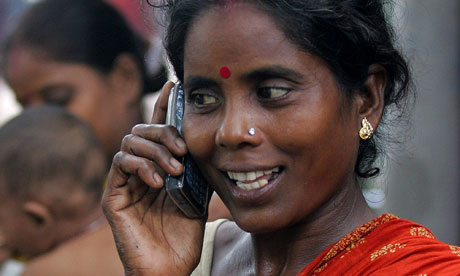
The potential for mHealth – the practice of medicine and public health supported by mobile devices – is obvious, but the global health community is largely still waiting for it to be realised. I believe that part of the reason is because we so-called overseas experts try to insist on leading the way.
I'm often reminded of the now-legendary fiasco that was, the One Laptop Per Child project, whose failures have been aptly summarised by the blogger Audrey Watters. It can be assumed that the project tried to pre-empt local demand (not to mention the market itself) with a predictably substandard solution – and failed to make much of an impact. While most mHealth projects benefit from much better design and implementation, much of the attention has been on either top-down initiatives that collect health information (frontline health workers, government bureaucracies, pharmacy distributors, etc) but do not necessarily benefit consumers; or relatively trivial applications of technology, like health-themed apps, games and rudimentary text messaging.
This isn't to suggest that top-down projects are worthless. While mHealth initiatives in many countries have focused on frontline workers and health bureaucracies before consumer demands, some such projects have doubtlessly saved many lives and strengthened many a health system. But to most effectively use mobiles - tiny networked computers now easily accessible by billions of low-income people as a driver for improved health, we need to think differently. We need to recognise that the real innovators who will ultimately deliver mobile health success are health service providers and patients who face pressing health challenges daily in under-resourced areas all over the world.
What this means is the next generation of mHealth will have to directly benefit the consumer. Health providers who develop durable mHealth business models that meet this demand will have to create a business technology that will likely outstrip any new whiz-bang donor fad or proposal buzzword.
A good example is the Apollo Hospitals Group in India. Several years ago, Apollo recognised an opportunity to change the traditional, but inefficient, model of tertiary care centres in rural areas of the country by leveraging India's deep mobile phone penetration. After starting with collecting simple health information via contact centres staffed with health professionals, Apollo has now scaled up to offering consultations countrywide using a sophisticated query database system informed by physicians, nurses and paramedics. Patients can call, conduct 3G video interviews, or SMS key health indicators like blood sugar levels or heart rate. PriceWaterhouseCoopers writes about this apporach in its report, 'Emerging mHealth: Paths for Growth.' What started out as an interesting pilot project has transformed into an integral part of Apollo's business model, and all without any foreign experts.
Grameenphone's successful Health Line product in Bangladesh works in a similar way. In a country that is 80% rural, with a doctor to patient ratio of 4000:1, Grameenphone extends primary healthcare access not only to Grameenphone subscribers, but to callers from village phones and community information centres. Subscription fees and call charges provide the basis of the business model, whose popularity can be seen in the roughly 3.5m calls fielded successfully to date. Grameenphone never intended to become an mHealth provider – it was simply an outgrowth that found a willing customer base.
Though donor funding will decrease for novel pilot projects and politicians may lose interest, a successful mHealth business model will not only thrive, but it will spread. The global health community should place a much larger priority on mobile health business models that work for providers and patients alike, and help share these technologies more broadly.
That might be the role of the donor but it's far from clear whether this imperative is within the capacity of today's large health donors.
First, foreign donors cannot be in the business of simply picking winners and losers. An mHealth venture capital fund for developing countries is one way to engage without distorting the market, but one that would have to take a gradual, tiered approach to financing, tied to specific key performance indicators (KPIs) rather than the traditional (and much easier to administer) annual report and audit cycle. Funding startups is not like grant administration. Venture capitalists typically assume that 80% or more of their ventures will fail, so they invest seed amounts in many projects. It requires not only throttling rounds of financing down to what is realistically useable, but also "skin in the game" in terms of board representation. For donors eager to increase their aid spend, with minimal long-term obligations, this can be a dicey proposition.
However donors decide to get involved, they must let healthcare consumers in emerging markets show us the future of mHealth innovation, not the other way around. Outsiders should take a big step back and look at what is already happening in developing countries. In places where the answer is "little or nothing," review the approach and results. Can the market benefit from incubating and coaching entrepreneurs as is happening in across Africa?
Perhaps, there is room instead to share examples and lessons learned from successful projects like those at Grameenphone and Apollo? And perhaps most importantly, there is a need to lobby for friendlier regulatory environments for business.
Inevitably, some markets simply will not be ready for mHealth solutions at all. But we truly are standing on the precipice of an incredible new era of mobile commerce. This wave of innovation is touching mobile health as well, but as in commerce, we must recognise that customers – what in aid are called 'recipients' – will lead the way. Once they do, we should follow.
Blair Reeves is a product leader at IBM's Enterprise marketing management group, and a former Peace Corps volunteer in Cameroon. You can find him on Twitter at @BlairReeves
This content is brought to you by Guardian Professional. To get more articles like this direct to your inbox, sign up free to become a member of the Global Development Professionals Network

